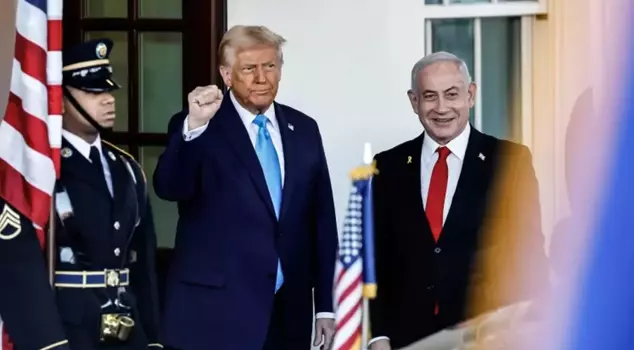
05.02.2025 15:00
US President Trump, who welcomed Israeli Prime Minister Netanyahu at the White House, stated that they would take control of Gaza and send Palestinians to other countries. As reactions to these scandalous remarks poured in, it was revealed that the $4 billion natural gas reserves in Gaza were behind the occupation plan.
U.S. President Donald Trump held a joint press conference with Israeli Prime Minister Netanyahu at the White House. Noting that Gaza has now become a vast area of complete destruction, Trump argued that it would be much better for Palestinians in Gaza to go to new settlements to be built in neighboring countries, primarily Egypt and Jordan.
THE HIDDEN AGENDA BEHIND THE DIRTY PLAN
It has emerged that behind this dirty occupation plan carried out by Netanyahu and Trump lies a natural gas reserve worth $4 billion, containing 38 billion cubic meters, located off the coast of Gaza. It is said that this gas, which Israel has been unable to extract for security reasons, will be extracted after Gaza is evacuated and shared among the parties involved.
HISTORY OF THE NATURAL GAS RESERVE OFF THE COAST OF GAZA
Since the discovery of gas in 1999, Israel has prevented Palestine from benefiting from its natural gas rights in the offshore Gaza area by delaying its policy. However, Palestinians have participated in various international events, such as the Eastern Mediterranean Gas Forum, to keep these rights on the agenda and have tried to make their voices heard through protests. Most recently, in September 2022, an event held at the Port of Gaza protested the confiscation of natural gas rights.
IN 2001, TWO WELLS WERE DRILLED, BUT...
For this natural gas discovered off the coast of Gaza, a contract was first signed in 1999 between the British Gas Group (BG) and the Palestinian Authority during Yasser Arafat's administration. The British Gas Group drilled two wells in the region in 2000, but in 2001, Israeli Prime Minister Ariel Sharon declared that the gas reserves belonged to Israel and stated that he would never buy gas from Israel, vetoing the agreement in 2003. In 2007, the Ehud Olmert government announced that a new agreement could be possible, but Israeli defense officials opposed it, citing that cash would be transferred to Hamas. In December 2007, BG Group withdrew from negotiations with Israel, and negotiations that resumed in 2008 ended without results. In mid-2015, the Palestinian Authority resumed negotiations with British Gas and increased its share in the gas fields from 10% to 17.5%. In 2016, Shell purchased a 55% stake in BG. However, due to Israel's opposition, Shell also expressed its desire to exit the consortium in 2017. The Palestinian Investment Fund sought a new foreign group to take over Shell's shares and began talks with Egypt's state-owned gas company EGAS in 2021. In February 2021, the Palestinian Authority signed a memorandum of understanding with Egypt regarding the development of Gaza's natural gas. Israel announced in June 2023 that this issue could be discussed with the parties.
EFFORTS YIELDED NO RESULTS
As a result, the efforts made by the Palestinian side over the past 24 years have not been sufficient for the development of their own natural gas in the offshore Gaza area. In other words, Israel has tied the development of the offshore Gaza gas fields to many conditions, especially after Hamas took control of the Gaza Strip, and has ensured the continuation of the energy blockade and thus the water blockade in the Gaza Strip.
WHY WAS EXTRACTION PREVENTED?
The various reasons for the prevention of the development of natural gas off the coast of Gaza for nearly a quarter of a century have emerged as a result of Israel's policy of isolating and controlling Palestine. This gas reserve would have significantly reduced Gaza Strip's dependency on Israel for energy and water. The Gaza Strip obtains water, apart from the water supplied by Israel, from underground water wells and seawater desalination plants. Both of these water sources require energy. Israel, which largely controls and restricts electricity and energy resources, also restricts water supply in this situation. It has been determined that if the gas in the waters off Gaza is extracted with the partnership of the Palestinian state, Palestine would meet its natural gas needs for 15 years and also generate income from the surplus gas. The Israeli occupation of northern Gaza will deprive Palestine of the benefits of this gas. In this case, Palestine's dependency on Israel for water and energy will continue to increase.